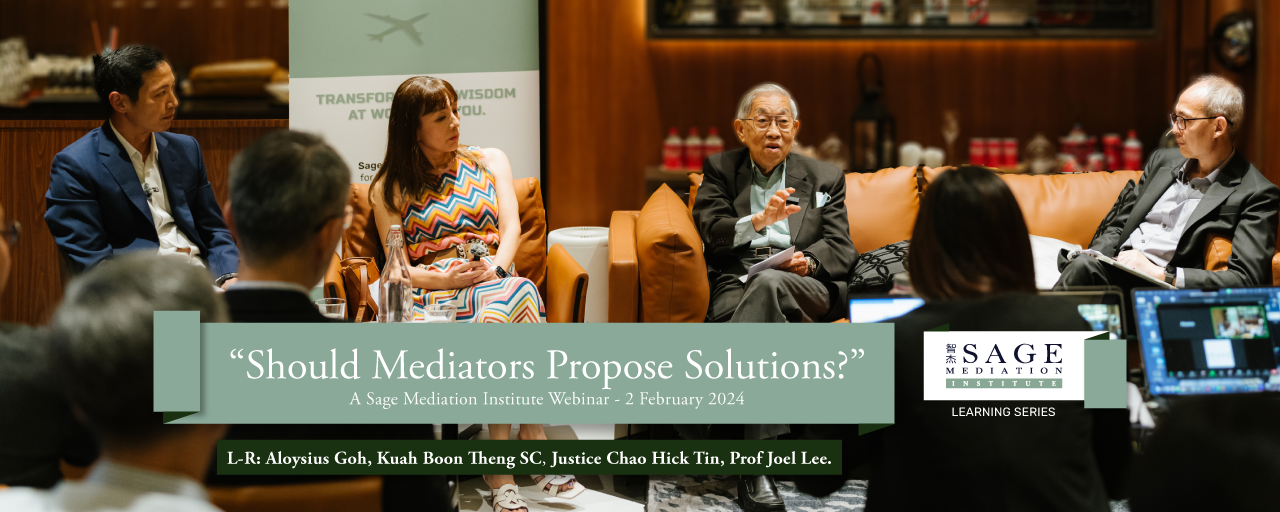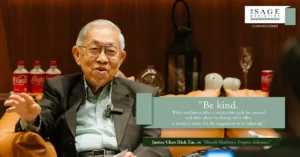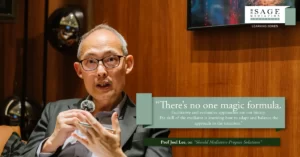
Sage Mediation Institute for Leadership Education (SMILE) held its inaugural seminar on the topic of “Should Mediators Propose Solutions” with insightful observations and discussions between our distinguished panelists of Justice Chao Hick Tin, Prof Joel Lee, and Ms Kuah Boon Theng SC.
The hybrid seminar held on 2 Feb 2024 was attended by 35 in-person participants and 300 online participants from 10 different jurisdictions.
Moderated by SMILE CEO, Mr Aloysius Goh, the speakers shared their perspectives on how mediators’ can calibrated interventions can uphold the spirit of the mediation principle of self-determination by the parties.
Reflecting on the panel discussion and the stimulating Q&A with the participants that followed, below are some of the key takeaways:
There is no one magic formula. There are different ways to approach each case and client. Facilitative and evaluative approaches are not binary and the skill of the mediator is knowing how to adapt and balance his approach as the situation requires. When parties are ready to talk and be creative, the mediator can play a more facilitative role and hold back on offering his ideas. However, when parties are stuck in their positions, a well-timed suggestion from the mediator can shift the parties to new perspectives.
Suggestions coming from the Mediator can be more acceptable. When there is a high degree of acrimony between the parties, parties may instinctively distrust a proposal from the other side. Framing a proposal as one that comes from the mediator can help to make the proposal more acceptable. Such proposals should only be made after the mediator has consulted with the parties separately and is confident that the obligations can be met if the proposal is accepted.
Gain trust first. The mediator should inform the parties that she/he will be pointing out the shortfalls of each of their positions and offers at the start of the mediation. When the mediator critiques their positions later and outlines possibilities that are less than what was desired, the parties will recognise what is happening and be less likely to complain.
It helps Mediation Advocates to know the mediator’s views. Sophisticated mediation advocates appreciate the added value of the mediator’s perspectives in achieving a satisfactory resolution for their client. The mediator’s views can reveal possible oversights in their case preparation and also help them better understand the other party’s motivations.
Experience matters. Proposing appropriate solutions stems from the willingness of the mediator to listen, and from the thoughtful application of his or her experience. Experience is key, and jurisdictions that want to promote mediation must evaluate the way new mediators are inducted. In addition to including mediation in the core curriculum of law schools, young mediators should be given opportunities to experience mediation, and be guided in their understanding of mediation best practices.
Be kind. Sugar-coat difficult messages. While the mediator’s reality-checking of stubborn parties can be well-intentioned, nobody likes being told they are wrong, or worse, stupid. When mediators offer a face-saving path for counsel and their client to change their offer, it makes it easier for the suggestion to be taken up.
Transforming conflict into opportunities for trust-building will require much more creative and collective thinking ahead. We are excited about what the future holds for SMILE and look forward to working with our friends to bring smiles to them and their clients.
Speaking of friends and smiles, those who attended the seminar in person, enjoyed an evening of delicious local satays, truffle fries, pizzas, and wine, as we celebrated the start of SMILE’s journey.
We’d like to express our thanks to the staff of The Gong for transforming their venue into a great venue for our seminar.
Also a big “thank you” to the speakers, Justice Chao, Ms Kuah, and Prof Joel; and to the Sage team of Samantha, Gordon, Nurjannah, and Franna, for enabling the event to run smoothly.
Thank you, too, to everyone who turned up online and in person!






Congrats with S.M.I.L.E!! What a great initiative. Thanks for this fantastic write-up with precious advice. Sounds like a valuable and same time fun with friends and colleagues event. Looking forward to attend the next one!